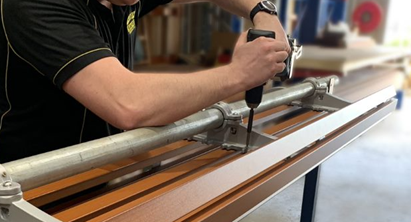Navigating Ethical Furniture Manufacturing: Understanding Modern Day Slavery and Making Conscious Choices

As the global furniture industry continues to grow, it's essential to address the ethical considerations linked to overseas manufacturing practices, including the prevalence of modern day slavery. In this article, we'll discuss the complexities of this issue and offer guidance on how consumers can make more informed choices. We'll also highlight the benefits of locally made products, like those from Astra Street Furniture, which are 100% made in Australia.
A Snapshot of the Global Furniture Industry
The international furniture industry relies on global supply chains, often outsourcing production to countries with lower labour costs, such as China, India, and Vietnam. While this approach can lead to cost savings, it's important to be aware of the potential ethical implications, including the risk of contributing to modern day slavery.

Design and manufacturing of our Astra Street Furniture takes
place at our Glendenning, Western Sydney warehouse
Uncovering the Hidden Costs: Modern Day Slavery in Furniture Manufacturing
Modern day slavery encompasses forced labour, child labour, and human trafficking, impacting an estimated 40.3 million people worldwide, as reported by the Global Slavery Index. The furniture industry is not immune to these issues, and it's crucial to understand how our choices can make a difference.
By being aware of these issues and taking action, consumers can play a role in reducing the prevalence of modern day slavery in the furniture industry.
Striking the Right Balance: Cost Savings vs. Ethical Considerations
When considering furniture purchases, it's important to strike a balance between cost savings and ethical production. By prioritising ethical manufacturing, consumers can help promote better working conditions and reduce the risk of modern day slavery in the industry.
In Australia, the Modern Slavery Act 2018 requires businesses to report on the risks of modern slavery in their operations and supply chains, and the steps they are taking to address these risks. This legislation aims to encourage companies to prioritise ethical practices in their manufacturing processes.
Empowering Consumers: Making Ethical Furniture Choices
Consumers have the power to influence the ethical practices of furniture manufacturers by making informed choices. To do this, consider researching companies' manufacturing practices, looking for certifications that indicate ethical production, and being cautious of prices that may be too good to be true. By choosing Australian made furniture, consumers can help promote local businesses that adhere to higher ethical and quality standards.
The Astra Street Furniture Commitment: Local Manufacturing and Ethical Practices
Astra Street Furniture takes pride in producing 100% Australian-made outdoor furniture, ensuring quality control, ethical practices, and sustainability. By manufacturing locally, Astra Street Furniture can actively combat modern day slavery while supporting local production and ethical supply chains.
When you choose Astra Street Furniture, you're not only getting high-quality products, but you're also contributing to a more ethical and responsible furniture industry. You can read our Corporate Social Responsibility (CSR) policy here.

Our local Astra Street Furniture manufacturing team work out of our Glendenning warehouse
Understanding the connection between overseas furniture manufacturing and modern day slavery is crucial in making informed, ethical decisions as consumers. By being aware of these issues and actively choosing companies that prioritise ethical practices, like Astra Street Furniture, we can help promote positive change within the industry. Let's work together to create a brighter future by making conscious choices and supporting ethical furniture manufacturing!


 Seating
Seating Benches
Benches  Curved Benches
Curved Benches Commercial Picnic Tables
Commercial Picnic Tables Concrete Plinth Mount Seating
Concrete Plinth Mount Seating Litter Bins
Litter Bins Bin Enclosures
Bin Enclosures  Shelters
Shelters Bike Parking
Bike Parking Architectural Bollards
Architectural Bollards Planter Boxes
Planter Boxes Skate Deterrents
Skate Deterrents  Drinking Fountains
Drinking Fountains Outdoor Classrooms
Outdoor Classrooms Athens Suite
Athens Suite Barcelona Suite
Barcelona Suite Berlin Suite
Berlin Suite Copenhagen Suite
Copenhagen Suite Dublin Suite
Dublin Suite Florence Suite
Florence Suite Glasgow Suite
Glasgow Suite Liverpool Suite
Liverpool Suite London Suite
London Suite Madrid Suite
Madrid Suite Manchester Suite
Manchester Suite  Milan Suite
Milan Suite Orbit Suite
Orbit Suite Paris Suite
Paris Suite Prague Suite
Prague Suite  Portsmouth Suite
Portsmouth Suite Rome Suite
Rome Suite Venice Suite
Venice Suite  Vienna Suite
Vienna Suite Woodville Suite
Woodville Suite School Furniture
School Furniture Healthcare Furniture
Healthcare Furniture Local Government Furniture
Local Government Furniture Park & Street Furniture
Park & Street Furniture Shopping Centre Furniture
Shopping Centre Furniture Aged Care Furniture
Aged Care Furniture